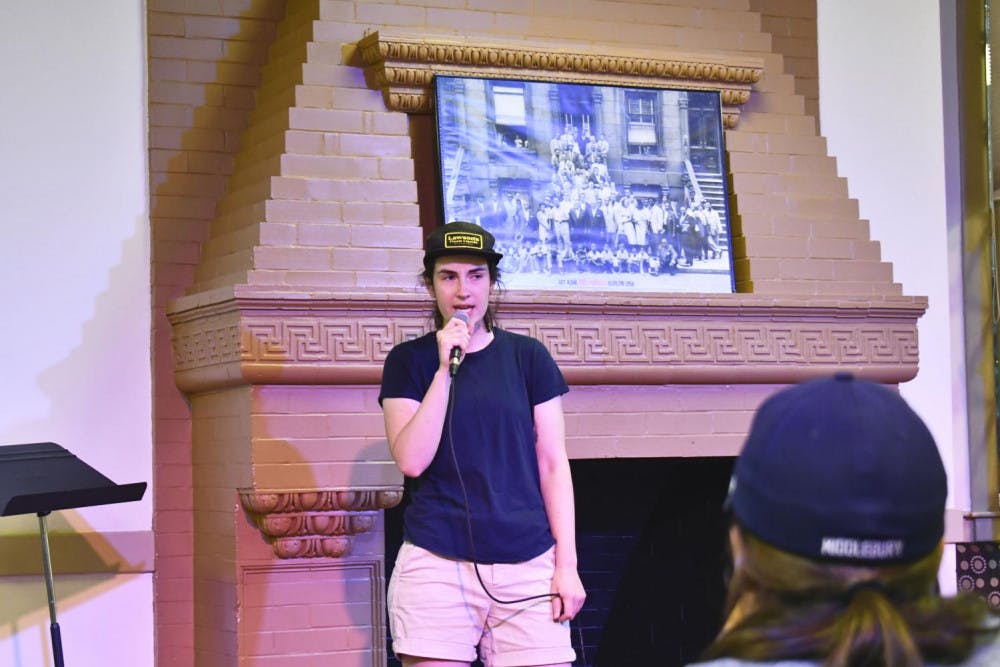Some say comedy is a boy’s club ... but the joke’s on them!
Last Friday and Saturday evenings, Sept. 20–21, Middlebury students gathered in Coltrane Lounge to learn about sketch comedy from some leading comics on campus.
The workshop, led by female-identifying members of the student-run sketch comedy group Middlebury Discount Comedy (MDC), was part of a larger program this past weekend called the Funny Femme Fest. The Femme Fest was a celebration of women in comedy and comprised of four workshops over the course of two days meant to encourage diverse voices in comedy.
In addition to MDC’s Friday session, the festival included a stand-up workshop led by American Studies Professor J. Finley. The women of Middlebury’s satirical newspaper, The Local Noodle, and members of various on-campus improv groups led workshops on satirical news writing and improv.
The MDC sketch lesson began, quite aptly, with a bizarre getting-to-know-you question. The attendees were asked to share not their majors or hometowns, but rather their most serial killer-like trait, setting the playful yet open-minded tone for the workshop.
After settling into the workshop with the serial killers among us, we were brought through an introduction to the ins and outs of sketch comedy, which usually consists of a series of short, few minute-long scenes known as “sketches.” The session’s leaders, Amy Conaway ’20, Em Ballou ’21 and Laurel Rand-Lewis ’20, provided us with the vocabulary to discuss sketches, as well as some of the basic structures we could use to craft them ourselves.
One of the fundamentals we learned was the idea of “The Game,” which is a bit of a catch-all term to describe what is truly funny or interesting about a scene. We also discussed the importance of creating a cast of characters that is balanced to include both traditionally funny or bizarre characters and what is known as a “straight character.” This character, unlike the other characters (but similar to the audience), is able to recognize the eccentricity of the situation. We then touched on practical elements to take into account when writing sketches to be performed, like including stage directions, sound cues and descriptions of physicality.
After going over the background of the discipline of sketch comedy writing, we dove deeper into feminist comedy writing and how intersections of gender and other identities inform the meaning of a joke or sketch.
When revising drafts of sketches, writers will often look at assumptions made about the gender or other identity markers of a character, asking themselves, “Does this character really need to be ______?” In other words, does the gender of a character matter in order for the joke to work? If not, assigning a gender through a character’s name or physical description may be unnecessary or limiting. One way the writers work around this is by assigning gender neutral names or even referring to characters as “Character no. 1.” After all, Conaway pointed out, we rarely define character by other specific aspects of their identity, such as their religion, favorite sports team or astrological sign.
With regards to addressing controversial subjects in sketches, the session’s leaders highlighted the importance of working honestly and openly with those around you. Sketch comedy, like other works of art, either theatrical or material, can be a powerful tool when it comes to examining societal norms and systems of oppression. But, if poorly executed, jokes can quickly become harmful reinforcements of structural inequalities.
A general rule of thumb, the leaders suggested, is known as “punching up,” wherein jokes remain aware of positionality. The rule enables the critique of power structures, rather than perpetuating them through stereotypes that continue to disempower different groups.
“The world of comedy is still presented with internalized sexism,” Ballou said. “It’s possible for women to be funny not because they play into stereotypes or misogynistic views for laughs, but because they themselves are humorous.”
According to Ballou, there is a general lack of diverse and inclusive comedy. “We need more comedians of color. We need more queer, disabled and working-class comedians.”
Funny Femme Fest rewrites the comedy narrative

MAX PADILLA/THE MIDDLEBURY CAMPUS
Comments



